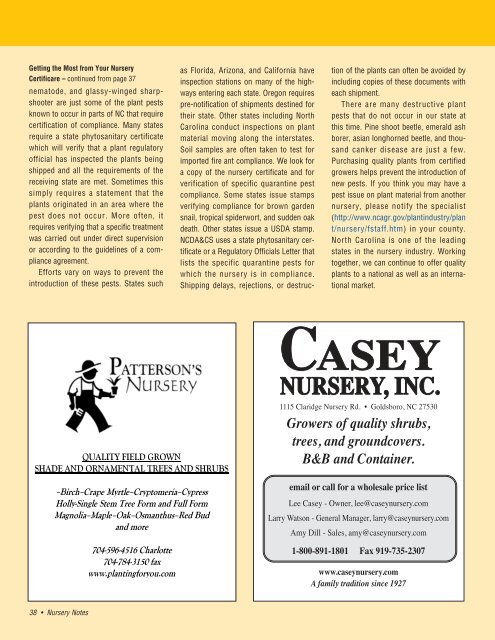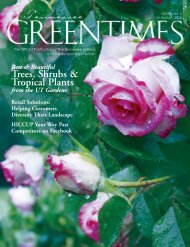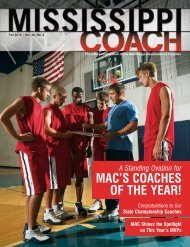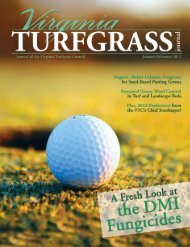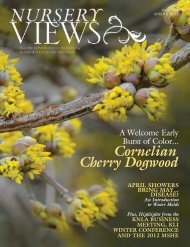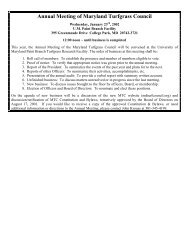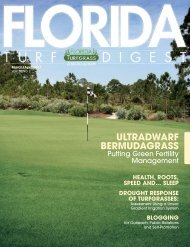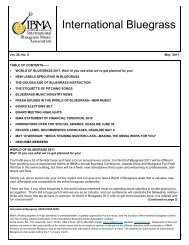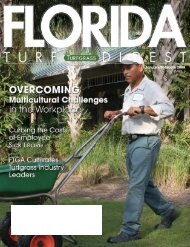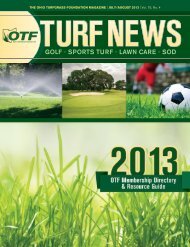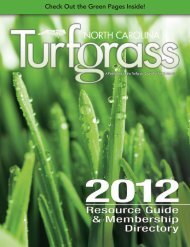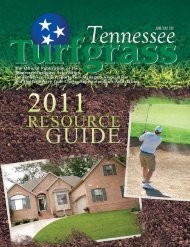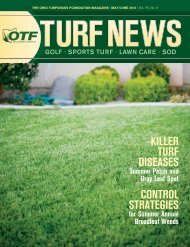Nursery Notes Nov-Dec 2011 - The Paginator
Nursery Notes Nov-Dec 2011 - The Paginator
Nursery Notes Nov-Dec 2011 - The Paginator
Create successful ePaper yourself
Turn your PDF publications into a flip-book with our unique Google optimized e-Paper software.
Getting the Most from Your <strong>Nursery</strong><br />
Certificare – continued from page 37<br />
nematode, and glassy-winged sharpshooter<br />
are just some of the plant pests<br />
known to occur in parts of NC that require<br />
certification of compliance. Many states<br />
require a state phytosanitary certificate<br />
which will verify that a plant regulatory<br />
official has inspected the plants being<br />
shipped and all the requirements of the<br />
receiving state are met. Sometimes this<br />
simply requires a statement that the<br />
plants originated in an area where the<br />
pest does not occur. More often, it<br />
requires verifying that a specific treatment<br />
was carried out under direct supervision<br />
or according to the guidelines of a compliance<br />
agreement.<br />
Efforts vary on ways to prevent the<br />
introduction of these pests. States such<br />
as Florida, Arizona, and California have<br />
inspection stations on many of the highways<br />
entering each state. Oregon requires<br />
pre-notification of shipments destined for<br />
their state. Other states including North<br />
Carolina conduct inspections on plant<br />
material moving along the interstates.<br />
Soil samples are often taken to test for<br />
imported fire ant compliance. We look for<br />
a copy of the nursery certificate and for<br />
verification of specific quarantine pest<br />
compliance. Some states issue stamps<br />
verifying compliance for brown garden<br />
snail, tropical spiderwort, and sudden oak<br />
death. Other states issue a USDA stamp.<br />
NCDA&CS uses a state phytosanitary certificate<br />
or a Regulatory Officials Letter that<br />
lists the specific quarantine pests for<br />
which the nursery is in compliance.<br />
Shipping delays, rejections, or destruction<br />
of the plants can often be avoided by<br />
including copies of these documents with<br />
each shipment.<br />
<strong>The</strong>re are many destructive plant<br />
pests that do not occur in our state at<br />
this time. Pine shoot beetle, emerald ash<br />
borer, asian longhorned beetle, and thousand<br />
canker disease are just a few.<br />
Purchasing quality plants from certified<br />
growers helps prevent the introduction of<br />
new pests. If you think you may have a<br />
pest issue on plant material from another<br />
nursery, please notify the specialist<br />
(http://www.ncagr.gov/plantindustry/plan<br />
t/nursery/fstaff.htm) in your county.<br />
North Carolina is one of the leading<br />
states in the nursery industry. Working<br />
together, we can continue to offer quality<br />
plants to a national as well as an international<br />
market.<br />
QUALITY FIELD GROWN<br />
SHADE AND ORNAMENTAL TREES AND SHRUBS<br />
–Birch–Crape Myrtle–Cryptomeria–Cypress<br />
Holly-Single Stem Tree Form and Full Form<br />
Magnolia–Maple–Oak–Osmanthus–Red Bud<br />
and more<br />
704-596-4516 Charlotte<br />
704-784-3150 fax<br />
www.plantingforyou.com<br />
1115 Claridge <strong>Nursery</strong> Rd. • Goldsboro, NC 27530<br />
Growers of quality shrubs,<br />
trees, and groundcovers.<br />
B&B and Container.<br />
email or call for a wholesale price list<br />
Lee Casey - Owner, lee@caseynursery.com<br />
Larry Watson - General Manager, larry@caseynursery.com<br />
Amy Dill - Sales, amy@caseynursery.com<br />
1-800-891-1801 Fax 919-735-2307<br />
www.caseynursery.com<br />
A family tradition since 1927<br />
38 • <strong>Nursery</strong> <strong>Notes</strong>


